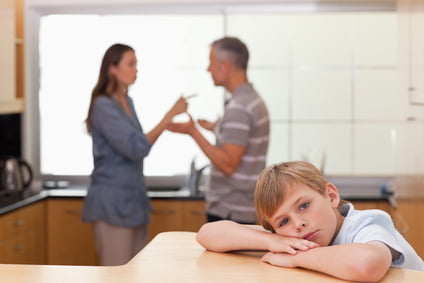 Going through a divorce is an emotional time not only for the parents, but also for the children. While the parents are obviously focused on the divorce, the children cannot simply fall by the wayside. Parents have an obligation to keep the communication lines open with their children and not allow them to simply become another statistic from a broken home.
Going through a divorce is an emotional time not only for the parents, but also for the children. While the parents are obviously focused on the divorce, the children cannot simply fall by the wayside. Parents have an obligation to keep the communication lines open with their children and not allow them to simply become another statistic from a broken home.
We have created a sort of checklist for parents to follow during this time. Our hope is that it will keep parents focused on their children while the divorce is going on. Hopefully, it can serve as a grounding point for both parents even when tempers start to flare and emotions run high. Just remember, even though you may not want to so much as look at each other, these feelings must be put aside for the sake of the children.
Step 1: Informing Your Children
This is not an easy thing to do. Regardless of how you and your spouse feel about each other, this really makes it official. This is the first of many times you will need to put aside any hard feelings and sit down with the children as their mother and father, not husband and wife. The purpose of this sit down is to inform the child or children so they are not taken by surprise. The earlier the better, as it will allow the children to begin adjusting to what will become a new way of life.
Step 2: Q&A
Once the children know what is happening, allow them to ask questions. This is an opportunity to be as upfront as possible about what is going on so the children know the divorce has nothing to do with them, but that it is problems with the relationship of mom and dad. You do not want to lie, but there is also no need to go into sordid details. You should be able to satisfy their curiosity with general answers.
Divorces because of infidelity can be tricky, though, especially if that other person is still in one of the spouse’s life. This is a time where you may want to tell them that there is someone else, but that someone else is not a replacement for mom or dad. Hiding facts or truth’s will only make matters worse and more painful for the children when they eventually find out the truth, and they will.
Step 3: Lifestyle Changes
In most cases, one parent will be leaving the home during the divorce process. It may even be necessary for financial reasons to sell the family home and move out altogether. These are things the children should know. Again, it simply gives them time to adjust. Be very open about which parent is leaving and the expected visitation schedule. This part of their lives will be a dramatic change, so keep that in mind if their response is extreme or emotional.
Step 4: Get Their Input
Allowing the children to have some say in the matter can be very helpful during these early stages, assuming the children are old enough to have a reasonable say in such matters. Find out where the children want to live and what days they would like to spend time with the parent that will not be around; giving them some say in the matter may take some of the focus away from the actual divorce and allow the children to grow and mature.
Step 5: Remain in Contact
One parent will obviously not be in the home on a daily basis, but this does not mean that parent should become an absentee mom or dad. Now, more than ever, it is important to have some type of contact with the children on a daily basis. An evening phone call to discuss their day or just to tell them you love them will go a long way in preventing animosity or a slanted view towards one parent.
Step 6: No Blame Game
At this point, the kids will be spending a lot of time individually with parents. If the divorce gets nasty, it is only natural to want to vent to someone, just do not do it to or in earshot of the children. Complaining about your soon-to-be ex around the children will go one of two ways, and neither result is desirable.
1. The child will side with one parent over the other and his or her attitude and behavior will dramatically change when he or she is around that parent.
2. The child will become angry with both parents and begin to lash out at all times. This can create even more problems between the parents, making the divorce even more difficult.
Step 7: Know the Trouble Signs
The statistics say more children will face some type of issue at some point during or after the divorce than children that will not. It is important to know the signs of problems so these problems can be addressed before this trouble behavior becomes a real problem and negatively affects the future of your child. Here are some basic red flags to look for in your children:
• Developmental regression in younger children – your toddler may have mastered some skills and all of a sudden regresses and needs help or flat out cannot do them any longer
• Children have trouble sleeping or are experiencing nightmares
• Obvious and excessive fear – this is very common in that younger children will begin to be afraid of things (such as a sudden fear of the dark) simply to get the attention of their parents.
• Pretending – in the child’s eyes, this is not really happening and he or she refuses to believe that mom and dad are divorced and living separate lives. The child will go on acting as though everything is normal. For instance, every day he or she may ask, “What time is daddy coming home for dinner today?”
• Anxiety – the child starts to throw fits when mom and/or dad are not around
• Scheming – this is very common in that the child tries to create an event or manipulate situations to get mom and dad together. In his or her eyes, if mom and dad are in the same room, maybe they can work it out and the family will be whole again.
• Shutting everyone out – the child feels alone and starts to withdraw emotionally
• Acting out – a child that never got into trouble in school is all of a sudden starting fights or not listening to teachers, possibly even struggling or failing in classes where he or she never had a problem
• Violent or suicidal tendencies – children will often take their frustration out on someone else or themselves. This is a very serious problem and you may need to bring in a professional to assist.
• Substance abuse – the child may decide to lose him or herself in substances to forget about what is going on at home. It may also be a way for the child to get the attention of his or her parents, thinking they will get back together to stop this from happening.
• Sex – this may be the ultimate stab to the parents heart. The child acts recklessly and becomes extremely sexually active as well as being careless in both partners and prevention.
As a parent, you need to make your children the priority in a divorce. It is very easy to become self absorbed, but use the children as a way to prevent this from happening. Focusing on them will not only benefit their present and future, but also provide you with some focus as well as a way of getting past the divorce and concentrating on the future. If both parents can manage this, it will also make getting along much easier in the years following the divorce.

